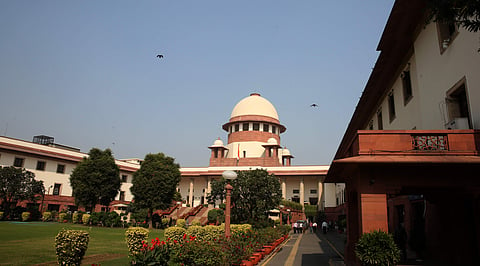

The Karnataka government has defended its February 5, 2022 order in the Supreme Court Tuesday, September 19, which bans wearing hijabs in educational institutions of the state. The government stated that it was a "religion-neutral" direction.
The Karnataka government was accused of targeting a particular religion with its order. The government blamed the PFI (Popular Front of India) for this accusation, and for creating controversy over it in the apex court. The court was hearing a batch of petitions challenging the Karnataka High Court verdict refusing to lift the ban on hijab in educational institutions, as per a report by PTI.
A bench of Justices Hemant Gupta and Sudhanshu Dhulia were presiding over the hearing. Solicitor General (SG) Tushar Mehta, who appeared for the Karnataka government stated that the PFI started the social media campaign over the Islamic headscarf earlier this year and there were continuous social media messages asking students to "start wearing hijab".
The SG alleged that the campaign was designed to create an agitation based on the "religious feelings of the people". The PFI is viewed as a hardline Muslim organisation and has been blamed for several incidents of communal violence, provoking calls for imposing a nationwide ban on it, Mehta said. However, the organisation itself has rejected the allegations.
Mehta also insisted that the agitation in support of wearing hijab in educational institutions was not a "spontaneous act" by a few individuals, it said the state government would have been "guilty of dereliction of constitutional duty" if it had not acted the way it did, as per PTI.
"In 2022, a movement started on the social media by an organisation called the Popular Front of India and the movement, as an FIR which was lodged subsequently suggested and now culminated into a charge sheet, was designed to create a kind of an agitation based on religious feelings of the people and as a part there were continuous social media messages that start wearing Hijab," Mehta said.
"This is not a spontaneous act of a few individual children that we want to wear a hijab. They were a part of a larger conspiracy and the children were acting as advised. Until last year, no girl student was wearing hijab in schools in Karnataka," he said. Referring to the state government's February 5 order, the SG asserted that it would not be correct to say it prohibits wearing only hijab and therefore, targets one religion.
"There was one more dimension which nobody has brought to your lordships' notice. I would not be exaggerating if I say that if the government would not have acted the way it did, the government would have been guilty of dereliction of constitutional duty," Mehta said.
"I would be able to show to your lordships as to how this problem arose and how the state, as a custodian of constitutional rights of everyone, tried to tackle the problem by order dated February 5, 2022," he added, insisting, "It is a religion-neutral direction."
During the hearing, Mehta also said that when the issue of wearing hijab in schools came to the fore, some people from another religion started coming with saffron 'Gamcha' (stole), a Hindu religious symbol, which is also prohibited as it is not a part of the school uniform. He claimed that far-fetched arguments were advanced by the counsel appearing for the petitioners that the government is throttling the voice of the minority.
"No. The government had to intervene because of the circumstances created," he said, referring to the tension the hijab and the saffron stole triggered on some campuses. The SG said that the state had directed educational institutions and not the students about uniforms.
To this, the bench asked, "You are saying that your emphasis was only on uniform?" Mehta replied, "Yes. We did not touch upon any aspect of religion." To the arguments that the hijab is an essential religious practice in Islam, Mehta asked how it could be so when people in the country where the religion was born do not essentially follow it.
"As a matter of fact, where nations or countries are Islamic countries, women are not wearing hijab. They are fighting against hijab," Mehta argued. "Which country is that?" the bench asked, to which Mehta replied "Iran".
The SG said that the purpose of uniforms is to ensure nobody feels inferior because of somebody dressing in a particular way. "That is the purpose of uniform. It is for uniformity. It is for equality among all students. Discipline means discipline. Here we are not talking about any discipline which inflicts any harm on them," he said, as per PTI.
Observing that students are not saying they will not wear the uniform, the bench asked about a situation where a student wears a muffler to an educational institution during winter. "That (the muffler) does not identify religion," Mehta responded.
Summarising his arguments, the solicitor general said that schools have a statutory power to prescribe uniforms and the government also has statutory power to issue directions to educational institutions to ensure compliance with rules. "It (government's February 5 order) was a non-arbitrary exercise of power, making it religion-neutral," he emphasised, adding that the petitioners went to the court claiming hijab is an essential religious practice but they could not establish it.
During the hearing, senior advocate Dushyant Dave, appearing for some of the petitioners, asked why the state government came out with such a prohibition 75 years after Independence. "What was the need? There is nothing brought on record to show that the circular was supported by any just reason or any justification. It came like a bolt from the blue," he said.
"So, suddenly you decide that you will have this kind of a ban. Why I say so — a series of actions in Karnataka targeted minority community in last few years," Dave contended. The hearing has been adjourned to Wednesday, September 21.
